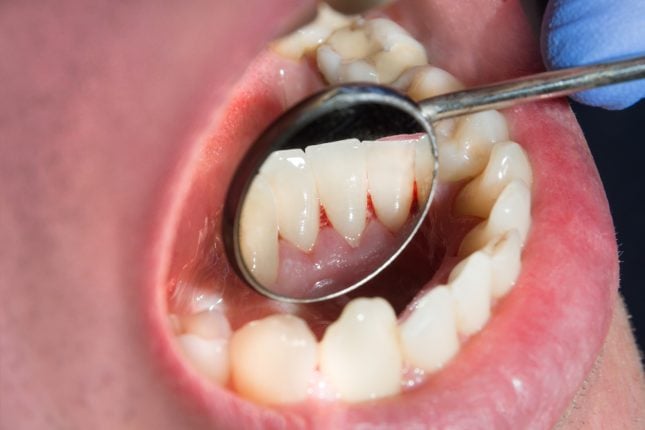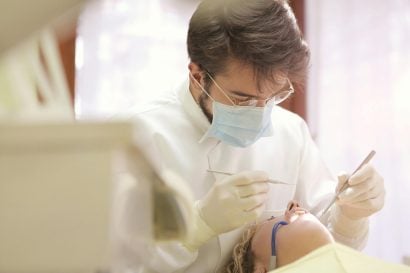What is Dental Tartar ?
Dental tartar—also called dental calculus—is much more than a cosmetic concern. This hardened deposit forms when dental plaque, a sticky film of bacteria, builds up on your teeth and hardens into tartar within just a few days if you don’t remove plaque regularly.
Once plaque on your teeth turns into tartar, no home brushing will remove it. Only a dentist or dental hygienist has the special instruments to remove this buildup safely.
Tartar on your teeth doesn’t just dull your smile. It creates a rough surface that attracts more bacteria that cause plaque, raising your risk of gum disease, chronic bad breath, and tooth decay.
Many people in Bangkok—especially busy professionals—don’t realize how quickly soft plaque can become tartar. That chalky or dark deposit you feel when you run your tongue over your teeth is often the first sign your oral hygiene routine needs reinforcement.
What Causes Dental Plaque, Tartar, and Buildup on Teeth?
Dental plaque forms when bacteria mix with food particles and saliva, creating a sticky film on your teeth. This layer builds up all day long, especially if you snack or skip brushing.
When not cleaned properly, plaque absorbs minerals and hardens into tartar on your teeth—a process known as tartar formation. This plaque and tartar buildup clings firmly around the teeth, especially near the gum line.
Common causes of tartar include:
-
Inconsistent brushing or flossing habits
-
Eating sugary or starchy foods that feed bacteria in your mouth
-
Dry mouth, which reduces saliva flow
-
Smoking or using tobacco
-
Skipping dental cleaning appointments
Over time, plaque and tartar can lead to gum inflammation and cause serious dental problems if left on your teeth.
Symptoms and Causes: How Tartar Can Lead to Serious Dental Problems
Because tartar is a hardened deposit, it’s difficult to remove without professional care. It often causes irritation, bleeding gums, and bad breath.
Tartar can lead to:
-
Yellow, brown, or black tartar spots
-
A rough, uneven surface that traps more plaque
-
Receding gums
-
Persistent bad breath
-
Increased sensitivity
These symptoms and causes often appear when plaque has been left too long. If you notice them, it’s important to see a dentist.
Why Dental Tartar Is Difficult to Remove Without a Dentist
Even the best daily brushing can’t remove dental calculus once it hardens. Only a dentist or hygienist can remove it safely.
Trying to scrape it yourself can damage enamel and gums. That’s why dental plaque and tartar are always best removed by a dental professional.
At The Smile Bar, we use AirFlow® technology to clean away buildup thoroughly. This method also helps polish your teeth, leaving them smooth and bright.
The Role of Professional Cleaning in Supporting Long-Term Dental Health
No matter how carefully you brush your teeth, plaque can stay behind and harden into calculus. This is why a professional cleaning every six months is recommended to keep your smile healthy and attractive.
During your cleaning, a dental professional will carefully remove plaque, polish your enamel, and look for early signs of tooth decay or gum issues. Professional care is essential because once tartar forms on your teeth, it can irritate gums, lead to inflammation, and weaken bone.
Regular visits not only help remove buildup but also support good oral hygiene habits. Your dentist or hygienist can show you techniques to improve brushing and suggest tools like dental floss or interdental brushes. Over time, these small adjustments make a big difference in preventing tartar.
How Professional Dental Cleaning Helps Remove Tartar from Teeth
A professional dental cleaning is the safest way to remove tartar from your teeth. AirFlow® uses a precise jet of air and powder to lift away plaque, calculus, and surface stains.
Once tartar has been removed, whitening treatments work more effectively because there is no barrier. This also helps prevent tartar from forming again.
Even if you brush your teeth twice daily, it’s almost impossible to remove plaque from your teeth completely. That’s why having your teeth professionally cleaned by experts is so important.
Treat Tartar and Protect Your Teeth and Gums
Removing tartar is essential to maintain healthy teeth and gums. It also helps prevent tooth decay and gum recession.
Treating tartar through professional care and adopting good oral habits will help prevent tartar buildup. A clean surface also reduces the chances that tartar can break and damage enamel.
When to See a Dentist and Why Early Treatment Matters
If you notice that plaque has built up on your teeth, don’t wait to see your dentist. Even a small amount can harden quickly into deposits that are difficult to remove without professional help.
Many people underestimate how easily plaque can become tartar. Any residue left on your teeth begins to absorb minerals and becomes what is called dental calculus. This hardened layer is associated with dental plaque and can lead to serious dental issues.
It’s essential to call your dentist or hygienist as soon as you see discoloration or irritation. Early removal prevents bacteria from spreading and reduces the risk of cavities, infection, and gum disease.
How Plaque and Tartar Can Lead to Serious Problems
Dental plaque that forms daily may seem harmless at first, but over time it can cause plaque and tartar to accumulate. This build-up of plaque not only dulls your smile but also weakens enamel.
If plaque is not removed, it gets plaque layered on top, creating thicker deposits that can cause serious dental conditions. Eventually, tartar damages tissues that lead your teeth to loosen or fall out.
Regular check-ups help professionals remove any plaque, monitor changes, and help prevent tartar. Visiting at least twice a year is one of the most effective ways to maintain a confident smile.
How Good Oral Hygiene Helps Prevent Tartar and Tooth Decay
Maintaining good oral hygiene is the most effective way to protect your dental health between visits. When plaque forms on your teeth, it can quickly harden into stubborn deposits. That’s why it’s essential to brush and floss daily and use dental floss for areas your toothbrush can’t reach.
The American Dental Association recommends brushing twice daily and flossing once to reduce bacteria in your mouth. These bacteria are what cause plaque to build up and damage enamel.
Even with excellent habits, small areas of hardened plaque can remain. That’s why you should visit your dentist regularly for cleanings to remove deposits. Combining home care with professional visits keeps your teeth strong and healthy.
Tips to Keep Tartar off Your Teeth Between Visits
After your cleaning, here’s how to help remove plaque and avoid new deposits:
-
Brush your teeth twice a day with a high quality toothpaste like the ones from Brillant Smile
-
Floss daily to remove food particles
-
Rinse with an antiseptic mouthwash
-
Drink water after meals
-
Remove plaque regularly by brushing after eating
These steps reduce bacteria that cause plaque and help prevent tartar in the future.
How Removing Tartar Boosts Confidence and Dental Health
Eliminating tartar on teeth is about more than looks. It also:
-
Reduces bacteria linked to gum disease
-
Prevents cavities and decay
-
Makes your teeth feel smooth and clean
-
Helps you feel confident in your smile
Many clients are surprised how quickly plaque and tartar buildup affects self-esteem. After treatment, they often feel renewed.
Real Transformations from The Smile Bar Clients
More than +10 000 clients have seen their smiles transformed:
🌟 “I never knew how much tartar buildup was hiding my teeth.”
🌟 “My teeth feel polished and smooth.”
🌟 “The whitening after cleaning was incredible.”
Before-and-after photos show what’s possible when you treat tartar and invest in your oral health.
Ready to Refresh Your Smile?
If you’re worried about plaque and tartar buildup or simply want a brighter smile, The Smile Bar Bangkok is here to help.
Book your appointment online today and discover how easy it is to transform your dental health and confidence.
Conclusion – TL;DR
Dental tartar is hardened plaque that can’t be removed at home. It causes bad breath, gum disease, and tooth decay—and only professional cleanings can eliminate it. At The Smile Bar Bangkok, we use modern techniques like AirFlow® to gently remove tartar, protect your gums, and reveal a cleaner, brighter smile.
Frequently Asked Questions
Is tartar removal painful?
- Tartar removal is usually not painful, though you might feel some pressure or mild scraping sensations as the deposits are lifted away. If you have sensitive teeth or inflamed gums, your hygienist can apply numbing gel to keep you comfortable throughout the procedure.
Does any toothpaste remove tartar?
- No toothpaste can remove tartar once it has hardened on your teeth. Tartar-control toothpastes can help prevent new deposits by reducing plaque buildup, but existing tartar requires professional cleaning.
Does tartar damage teeth?
- Yes, tartar can lead to serious dental issues over time. It creates a rough surface that harbors bacteria, contributing to gum disease, enamel erosion, cavities, and even tooth loss if left untreated.
Does teeth tartar cause bad breath?
- Yes, tartar buildup often contributes to chronic bad breath. The rough surface traps bacteria and food particles, which release unpleasant odors as they break down. Professional cleaning is the most effective way to remove tartar and restore fresh breath.
Why does tartar buildup on teeth?
- Tartar forms when soft plaque isn’t removed thoroughly through brushing and flossing. Over time, minerals in saliva harden plaque into calculus that bonds firmly to enamel. Factors like dry mouth, frequent snacking, smoking, and inconsistent oral hygiene make tartar more likely.
Where can I get tartar removal in Bangkok?
- You can have tartar professionally removed at many dental clinics and cosmetic studios in Bangkok. The Smile Bar, for example, offers gentle AirFlow® cleaning that lifts away plaque and tartar while polishing your enamel. It’s a convenient option if you prefer a modern, spa-like setting for your dental care.











